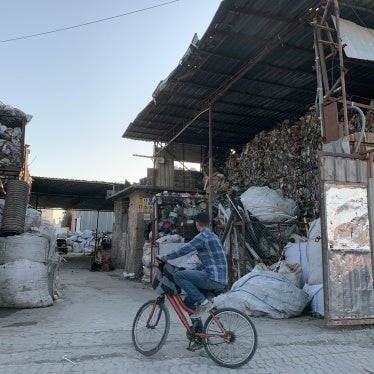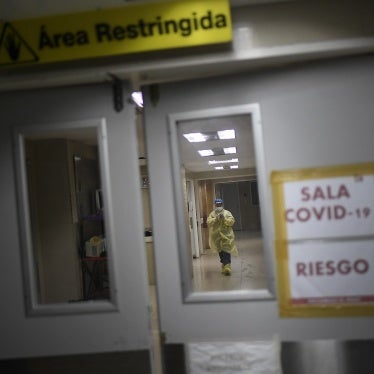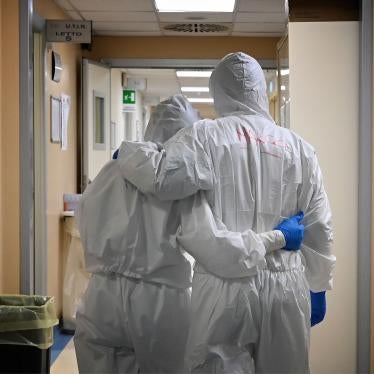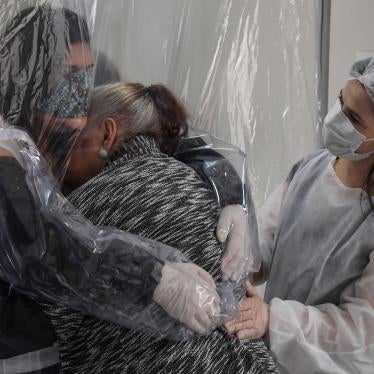Catarina de Albuquerque
Special Rapporteur on the human right to safe drinking water and sanitation
Sustainable Human Development Section
Special Procedures Division
UNOG-OHCHR
Palais des Nations
CH-1211 Geneva 10, Switzerland
Dear Ms. de Albuquerque,
Please accept our submission in response to your January 28, 2014 request for information in relation to your annual thematic report to the General Assembly. This submission focuses on the relationship between access to information and participation in realizing the human rights to water and sanitation.
Access to information is a fundamental precursor to the ability of rights-holders to participate meaningfully in decision-making related to the rights to water and sanitation. The Committee on Economic, Social and Cultural Rights (CESCR) recognized the importance of access to information in its General Comment 15, when it defined the core content of the right to water to include information accessibility, which includes the right to seek, receive, and impart information concerning water issues.[1]
Recent Human Rights Watch research demonstrates that there exist many obstacles in accessing information related to water and sanitation. Information may be inaccurate, incomplete, or inconsistent. Information may be provided too late for rights-holders to act upon. The state may not generate the information rights-holders need, for example, data on water quality via testing. States may also fail to take affirmative actions to ensure non-discrimination and equal access to information for marginalized groups, such as indigenous populations and people with disabilities. And, lack of information on complaint mechanisms may limit access to effective remedies when there is a negative impact on the rights to water or sanitation. Thus, in order to ensure meaningful participation in decision-making around water and sanitation, steps should be taken by states to address these obstacles.
Information should be accurate and complete
Access to information for decision-making requires that the information be accurate and complete. Human Rights Watch has found that the rights to water and sanitation may be negatively impacted when people rely on inaccurate information to make decisions. For example, we found in Sierra Leone that villagers who relocated to make way for a mining project reported a decline in their living conditions, particularly their access to water and sanitation.[2] They told Human Rights Watch that they had been promised houses with piped water upon their relocation, but instead they have only received water from trucks or from boreholes. According to relocated community members, there is not sufficient water for consumption or sanitation. The majority of the boreholes do not work and water trucks do not arrive on a reliable schedule. Toilets lack sufficient water to flush, residents often use outhouses that overflow, and the community has noted a negative impact of the resulting contamination on their health. Similarly, community leaders in Mozambique involved in decision-making around relocation of their communities (also related to mining) reported to Human Rights Watch that the information they received regarding relocation options was incomplete.[3] All members of the community, including the most marginalized, must be allowed to access accurate information.
Information should be timely
Information related to changes in water or sanitation resources or services should be timely. Human Rights Watch has found this to be lacking in some instances when mining exploration or operations cause relocation or have an impact on a community’s land rights or natural resources, including water. In Karamoja, Uganda, for example, Human Rights Watch found that information about the potential impact of exploration or mining of natural resources needed to be provided to indigenous communities at every stage of the mining process—from exploration, to extraction, and post-extraction—for their participation in decision-making to be meaningful.[4] In order to meet their responsibility to respect communities’ free, prior, and informed consent (FPIC) rights, businesses should provide timely information about these impacts and governments should ensure that companies do so through regulation and enforcement. In Mozambique, Human Rights Watch found that lack of timely information about relocation led households to make decisions that had a negative impact on their food security.[5]Households prior to relocation had adequate access to water to plant crops; however, they were not provided timely information about the date of their relocation and some households did not plant during the appropriate season, believing they would be relocated. The relocation then occurred after they could feasibly plant a crop in their new location. Because of the misinformation and lack of planning around timing, some of the households that did not plant crops were not provided adequate food assistance until the next harvest, profoundly affecting their food security. Human Rights Watch spoke to many individuals who said their families were going hungry.
Information should be consistent
Human Rights Watch has found that conflicting information on water and sanitation can make it difficult for rights-holders to act upon available information. For example, Harare, Zimbabwe we found that the majority of the people we spoke with did not know whether or not the water in their communities was safe to drink.[6] Some of them reported to Human Rights Watch that they had received information about the available drinking water, but it was not clear to them how long this information was valid. One woman explained that health workers had told her months before to disinfect the tap water, but they did not say whether or not the water from local boreholes should also be disinfected. Another woman said that health workers had told her that water from both boreholes and tap water should be disinfected.
States may need to generate necessary information/data
The information that rights-holders need to participate fully in decision-making around water and sanitation may require the state to generate and disseminate such information particularly regarding water quality or quantity. For example, Human Rights Watch research on the impact of the untreated effluent from the leather tanning industry on the community of Hazaribagh, Bangladesh, found that the government failed to conduct testing of water quality, despite having the legislative powers to do so and there being credible evidence in the public domain for over a decade of extreme contamination of local water sources by untreated tannery wastewater, includinganimal flesh, sulfuric acid, chromium, and lead. The lack of government testing of environmental parameters is also despite a long-standing body of research linking such contamination with negative impacts on the health and livelihoods of residents in the nearby community.[7] Local residents of the slums around the Hazaribagh tanneries, many of whom were very poor, told Human Rights Watch that they were frustrated that the government did not test the water quality nor inform them of any test results, leaving them anxious about the extent of the contamination in their water sources. Without this information, these community members could not take actions to mitigate the negative impact of the pollution.
Information should be available in a non-discriminatory and accessible manner
States may need to take affirmative steps to prevent discrimination in the realization of the right to water, including access to information and in decision-making around it. The CESCR specifically highlighted the role states should take to ensure that women are not excluded from decision-making processes concerning water resources and entitlements and to provide resources for indigenous peoples to design, deliver, and control their access to water.[8] In both instances, access to information is fundamental to ensuring non-discrimination in decision-making and control over access to water and sanitation. For example, the government of Uganda does not recognize communities in Karamoja as indigenous peoples nor does it adequately protect their rights over land they traditionally have occupied and used. When the government granted exploration licenses and mining leases in Karamoja, Human Rights Watch found that these indigenous communities had inadequate information and were not able to participate in decisions regarding mining activities on their land. Very little information was provided as to how the proposed exploration and mining projects would impact community members’ access to water and sanitation. In one instance, while the company had undertaken an environmental impact assessment, the findings of this assessment were not shared with the community nor made accessible in any way. In another, while the company had promised to provide boreholes, it was unclear at what stage of the mining process these boreholes would be provided and there were no mechanisms through which the communities could enforce these verbal promises.[9] Residents of the affected communities told Human Rights Watch there was a lack of consultation and access to information from both mining companies and local government officials, particularly regarding employment, land, and possible impacts on the environment—putting communities’ access to essential resources, such as water, at risk. Human Rights Watch recommended that free, prior, and informed consent be secured through the indigenous communities’ own representative institutions, including through councils of elders and women and youth caucuses. In the case of persons with disabilities, information should be available in accessible formats to facilitate their participation in decision-making processes. This includes developing and disseminating information in Braille, sign language and in easy-to-read formats (designed for people with intellectual disabilities).
Access to information is important for effective remedies
Participation is not only key to mitigating negative impacts on the rights to water and sanitation that may be caused by government or third parties actions, it is fundamental to crafting an appropriate remedy when problems do arise. For example, Human Rights Watch found in Mozambique that communities relocated for mining operations lacked information to file complaints.[10] During consultation processes, communities expressed access to water (river banks) as one of their top demands or priorities. The land they relocated to, however, has decreased water quantity, which negatively impacts households’ agricultural productivity and food security. The government and companies behind the relocation have agreed to try to address the problems faced by resettled communities. At the time of the research, Human Rights Watch found that most of the community residents interviewed had little information about any plans to address these problems and said that they did not have meaningful opportunities to contribute their inputs into the design of remedies. In the months since, companies have taken some remedial actions to improve access to drinking water.
We thank you for the opportunity to provide this information and are ready to answer any further questions you or your staff may have.
Sincerely,
Liesl Gerntholtz Joseph Amon, PhD MSPH
Director, Women’s Rights Division Director, Health and Human Rights Division
Human Rights Watch Human Rights Watch
[1]UN Committee on Economic, Social, and Cultural Rights, General Comment No. 15, The Right to Water, U.N. Doc. E/C.12/2002/11 (2002), para. 12(c)(iv). The general comment further states that when adopting and implementing national water strategies or plans of action, it should be done on the basis of a participatory and transparent process. Ibid. para. 37(f). In addition, “individuals and groups should be given full and equal access to information concerning water, water services, and the environment, held by public authorities or third parties.” Ibid. para. 48.
[2]Human Rights Watch, Whose Development? Human Rights Abuses in Sierra Leone’s Mining Boom (New York: Human Rights Watch, 2014), https://www.hrw.org/reports/2014/02/19/whose-development-0.
[3]Human Rights Watch, “What is a House without Food?” Mozambique’s Coal Mining Boom and Resettlements (New York: Human Rights Watch, 2013), https://www.hrw.org/reports/2013/05/23/what-house-without-food.
[4]Human Rights Watch, How Can We Survive Here? The Impact of Mining on Human Rights in Karamoja, Uganda (New York: Human Rights Watch, 2014), https://www.hrw.org/reports/2014/02/03/how-can-we-survive-here-0.
[5]Human Rights Watch, “What is a House without Food?” Mozambique’s Coal Mining Boom and Resettlements (New York: Human Rights Watch, 2013), https://www.hrw.org/reports/2013/05/23/what-house-without-food.
[6]Human Rights Watch, Troubled Water: Burst Pipes, Contaminated Wells, and Open Defecation in Harare (New York: Human Rights Watch, 2013), https://www.hrw.org/reports/2013/11/19/troubled-water-0.
[7]Human Rights Watch, Toxic Tanneries: The Health Repercussions of Bangladesh’s Hazaribagh Leather (New York: Human Rights Watch, 2012), https://www.hrw.org/reports/2012/10/08/toxic-tanneries.
[8]CESCR General Comment 15, para. 16(a), (d).
[9]Human Rights Watch, How Can We Survive Here? The Impact of Mining on Human Rights in Karamoja, Uganda (New York: Human Rights Watch, 2014), https://www.hrw.org/reports/2014/02/03/how-can-we-survive-here-0.
[10]Human Rights Watch, “What is a House without Food?” Mozambique’s Coal Mining Boom and Resettlements (New York: Human Rights Watch, 2013), https://www.hrw.org/reports/2013/05/23/what-house-without-food.








